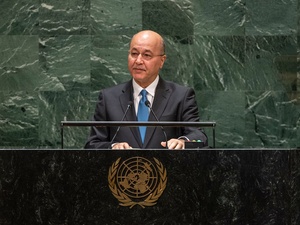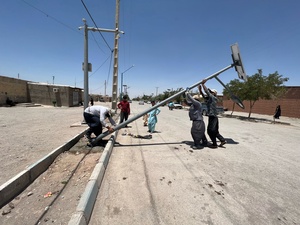UNHCR concern mounts for Iranian Kurds stranded on Iraq-Jordan border
UNHCR concern mounts for Iranian Kurds stranded on Iraq-Jordan border
UNHCR is increasingly concerned about the health and well-being of a group of 200 Iranian Kurds who have been stranded on the Iraqi side of no man's land at the Iraq-Jordan border since early last year. The Kurds, unhappy with their situation at the border and demanding resettlement to a third-country, have recently become more vocal, holding regular demonstrations expressing discontent with their present situation.
Over the past two weeks, three refugees started hunger strikes and their health has seriously deteriorated. While UNHCR has done all in its power to send assistance and medical care, the refugees have consistently refused any of this help, putting the life of the most vulnerable among them in serious danger.
The refugees have also been moving towards the Jordanian part of no man's land, which has angered Jordanian border officials. The Jordanians have always made clear to the refugees not to trespass into the Jordanian side. Last week, the Jordanians felt obliged to remove the Kurds' demonstration sites, much to the dismay of the demonstrators.
The Iranian Kurds arrived in no man's land in early 2005. They had spent more than 25 years as refugees in Al-Tash refugee camp in central Iraq, having fled the Iranian Islamic revolution. The group left Al-Tash for the border when the security situation around Ramadi seriously deteriorated in early 2005. They were denied entry into Jordan, however. Since 2005, the group has put pressure on UNHCR to allow them to enter Jordan and be resettled to a third country, citing the insecurity in Iraq.
UNHCR has been trying to find a solution, but we cannot force the Jordanian authorities to allow access into their country. Resettlement is unfortunately also not something UNHCR alone can provide. It is based upon a demonstrated need in the absence of a solution in an asylum country, and is provided at the discretion of resettlement countries who have limited quotas to resettle refugees.
Since last year, UNHCR has been offering the group relocation to Kawa settlement in northern Iraq. Some 1,300 Iranian Kurds are presently living in Kawa with UNHCR assistance, receiving food and health care as well as education and other services. Houses are being built on the site and Erbil Governorate has allowed for the local integration of this group. In all, over 10,000 Iranian Kurds registered with UNHCR are living in northern Iraq, where their local integration continues to progress and without serious security concerns.
UNHCR is still encouraging the group of 200 Iranian Kurds at the Iraq-Jordanian border to go to Kawa as well, but they remain adamant in their refusal to go to northern Iraq and continue pressing for resettlement.








